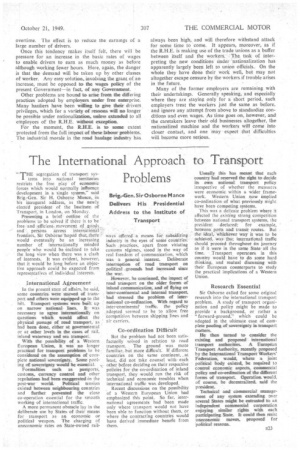The International Approach to Transport
Page 57

If you've noticed an error in this article please click here to report it so we can fix it.
Problems
Brig.-Gen.Si r Osborne M ance Delivers H is Presidential Address to the Institute of Transport " THE segregation of transport systems into national ter-ninnies-. restricts the free play of economie forces which would normally itiffitence: development in a single system,— raid Brig.-Gen. Sir H. Osborne Mance, in his inaugural address, as the amply elected presidentof the Institine. of Transport, in London, on Monday. Presenting a brief outline' of the problems to be solved if there is to be free and efficieivamovement of wads; and persons across international frontiers,. Sir Osborne-hoped that.there would eventually be an increasing number of internationally minded people who would. be inclined to take the long view when there was a clash of interests, It was evident, however; that it would be long before an objec7 tive approach could be expected from representatives of individual interests.
• international Agreement In the present state of affairs, he said, some countries-were gnawed a transport and others Were equipped tqa to the hilt. Transport syatems, were built' up on marriNV Bat:aimed Lines. h was necessary to agree inieunationaBy on questions which would § the physical passage art road transport,' as had helm done+ either at gorterturiental or at other levelsin the cases of rail, inland waterway and wa rampart.
With the possibilaty of a Western European Union it was no longer practical for transport ptoblents to be
considered on the risnomplittai off' national sovameignay., Some pool
ing of seteereigaty would be essential.
Formalities suck as. passports, customs, currency control and other regulations had been exaggerated in the post-war world. Poifticat tension existed between nteighbouring countries and further prevented the close co-operation essential for the smooth working of international traffic. A mere permanent obstacle lay in the deliberate use by States. of their means for transport as an economic or political weapon. The charging of uneconomic rates on State-owned rail wayS offered a means fOr subsidizing industry in the eyes of some countries-. Such practices, apart from vitiating customs regimes, stood in the way of real freedom of communication, which wa-s, a general interest. Deliberate ionentaption of road tampon on poritikall .gtoimalls bad incteased since the war. However. he continned„ the impact of road transport cm the older firma of inland connuniatication, and of tying on inter-continettul and interaaF transport, had stsessed the gambling'. of international co-ottehnation, With regard tin in Nen ti n enta I' traffic. the poky adopted seemed to be to allow free competition between shipping lines and air carriers.
But the problem had not been satisfactorily solved in relation to road transport. The ground was more familiar, but more difficult. If different countries on the same continent, . at least, did not take counsel with• each other before deciding on their respective policies for the co-ordination of inland transport, they would run the risk of technical and economic troubles when international traffic was developed. Recent discussions on the possibility of a Western European Union had emphasized this point. So far, international agreements had been made only where transport would not have been able to function without them, or where the contracting countries would have derived immediate benefit from them. ttlatuni4 this has meant that each country had reserved the night to decide its own national transport policy irrespective of whether the measures were economic within a wider framework. Western. Union now implied co-ordination of what previously might have been competing systems.. This was a delicate problem where it affected the existing strong competition between national transport systems, the president declared; forexample, between ports and transit routes. But the ideal, whichever way it was to be achieved, -was that international traffic should proceed throughout its journey as if it were in the same State all the time.. Transport operators in this country would have to do some hard thinking, and mutual discussing with their European counterparts to study the practical implications of a Western Union.
Research Essential Sir Osborne called for some original research into the international transport problem. A study of transport organization and policy might be made to provide a background, or rather a "forward-ground," which could be adopted. in the ultimate case of complete poolirm of sovereignty in transport Ma Rtte-11
He then turned to. consider the
exist andproposed international transport authoritiesA European Transport Authority, recently proposed by the: International Transport Workers' Federation, would, where: a joint
bady enlisted, be required to contimai economic aspects, commercial pokey and co-otaiiitation of the different forms of ransport. Operation would, of course, be decentializedi. said the president.
Technikal and commercial' management of any system extent:hag over sevetat Stales might be entnusted to. an independent cominandat corporation enjoying SiMilal! rights with each participating State. It cottid then resist uneconomic movea, proposed for 'political reasons.




























































































